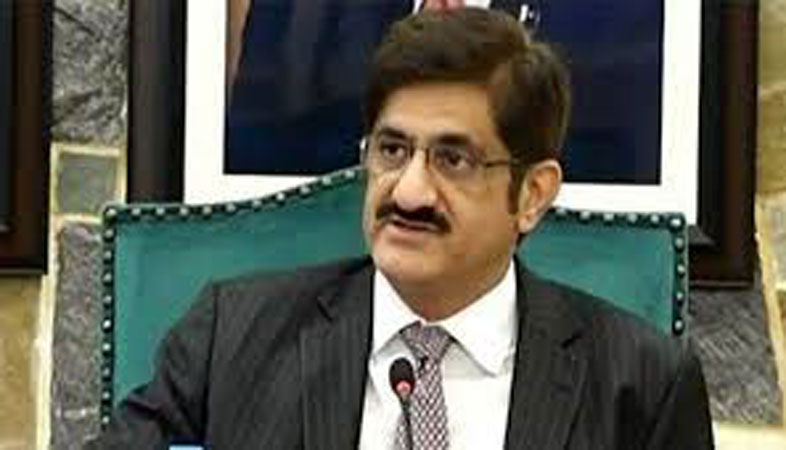 Sindh Chief Minister Syed Murad Ali Shah has said that neither the federal government nor the International Monetary Fund (IMF) has approached him with concerns regarding the National Finance Commission (NFC) Award or the 18th Amendment.
Sindh Chief Minister Syed Murad Ali Shah has said that neither the federal government nor the International Monetary Fund (IMF) has approached him with concerns regarding the National Finance Commission (NFC) Award or the 18th Amendment.
He said that the federal government has started implementing the 18th Constitutional Amendment by devolving or winding up some of its ministries.
He spoke to the media after attending the launch of the World Bank’s latest editions of the South Asia Development Update (SADU) and Pakistan Development Update (PDU) for October 2024 at a local hotel.
Mr. Shah stated that his government has reservations about some other matters, and he is in discussions with the federal government. He added that the Pakistan Peoples Party would only support measures that are in the interest of the country.”
In response to a question, Murad Shah said that he learnt from media reports that the federal government has terminated power purchase contracts with five IPPs, which is expected to reduce electricity tariffs.
Mr. Shah suggested that the government should take steps to utilize surplus electricity. He proposed that industrial units could be offered electricity at subsidised rates if they increased their production capacity by starting additional night shifts. “This would help offset the capacity charges paid to the IPPs by the federal government, improve production, and create job opportunities for unemployed workers,” he said.
Speaking at the launch of The World Bank’s editions of the South Asia Development Update (SADU) and Pakistan Development Update (PDU) for 2024 at a local hotel, the CM said that the reports, which provide critical insights into the economic challenges faced by Pakistan and the South Asian region, praised for offering a roadmap for sustained growth.
The chief minister said the devastating floods of 2022, which submerged nearly 70 per cent of the province caused extensive infrastructural damage, compounding the developmental issues already exacerbated by the COVID-19 pandemic,” he said and added that despite these challenges his government restored infrastructure and alleviated the economic hardships faced by people of the province.
“We are committed to overcoming these obstacles, and the people of Sindh have shown their confidence in the government to serve and uplift them,” said Murad Shah.
Talking about poverty alleviation, Mr Shah said that his government responded to findings in the report, which underlined rising poverty during 2023. “The Sindh government has taken several steps to support the most vulnerable segments of society,” he said. He added that the Emergency Housing Reconstruction Project was a key initiative aimed at providing housing for over two million people whose homes were destroyed in the 2022 floods. “This project, with a focus on climate resilience, is expected to drive socio-economic changes in rural areas,” he said.
The chief minister who holds the portfolio of the finance minister said that to combat inflation, the Sindh government has mobilised district administrations to regulate prices of essential goods, working closely with federal authorities to manage the Consumer Price Index (CPI) and Sensitive Price Index (SPI).
Murad Shah quoting the World Bank report said that it has also shed light on the country’s circular debt in the power sector, an issue exacerbated by low electricity bill collection rates. “The Sindh government, in cooperation with federal agencies, has ramped up efforts to curb electricity theft and improve recovery operations.
The CM said that the provincial government was actively addressing the lack of access to formal financial lending for the poor. “The People’s Poverty Reduction Program (PPRP), a flagship initiative, is offering zero-interest loans to poor entrepreneurs,” he said and added that the plans were underway to extend these efforts with assistance from international partners like the International Fund for Agriculture Development (IFAD) and the European Union, with programs aimed at supporting small businesses and innovative SMEs.
Despite the report’s concerns over increasing public sector borrowing, Mr Shah said that his government reassured attendees of its fiscal discipline. “while domestic borrowing has been authorized, the province has largely avoided it, instead boosting revenue through tax reforms,” he said and added most of the borrowing has come from international development partners at highly favourable rates, aimed at rehabilitating flood-affected areas.
Sindh’s energy policy is also a focus of the government’s plan, with a renewed emphasis on utilising indigenous resources for electricity generation. He added that a new power policy, set to be launched soon, would prioritise private and foreign investment in both conventional and renewable energy sectors, ensuring the province’s energy self-sufficiency.
we know that the region in general and the Province of Sindh in particular
has faced severe economic challenges during the last few years such as unprecedented floods in Sindh in the year 2022 which inundated almost 70% of the provincial landscape causing severe damages including infrastructural losses – creating a big challenge for the Government of Sindh to restore the infrastructure within shortest possible time.
Minister P&D Syed Nasir Shah addressing the gathering said the Sindh government compared to other provinces has implemented the development projects assisted by the federal government properly. He added that the project implementation has trickled down their benefits to the people of the province.
The program was attended by provincial ministers – Dr Azra Fazal, Syed Nasir Shah, Saeed Ghani, Syed Sardar Shah, Jam Khan Shoro, Advisor Najmi Alam, Waqar Mahdi, MPAs, chairman P&D Najam Shah and provincial secretaries of different departments. The World Bank was represented by its Chief Economist of the South Asia region Ms Franziska Lieselotte Ohnsorge and others.


